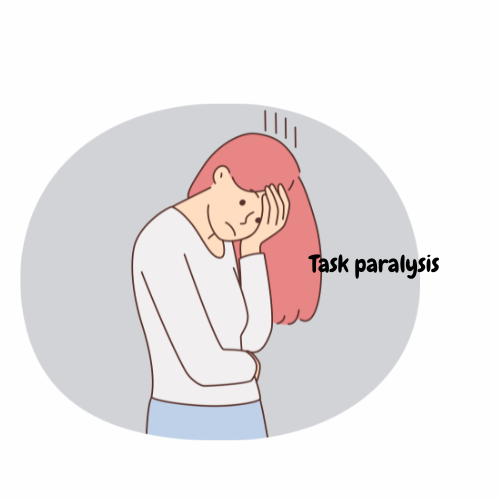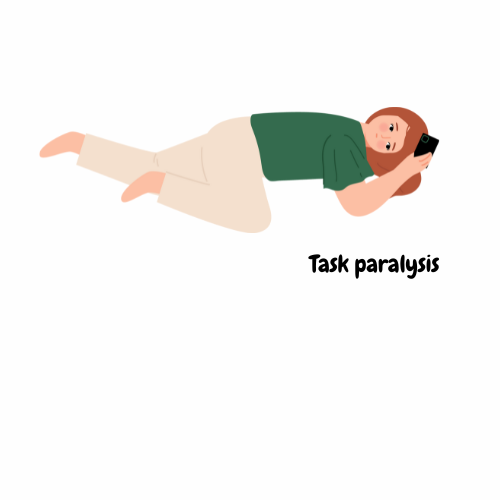ADHD and Task Paralysis in Women: Understanding and Managing Feeling Stuck

Do you ever find yourself staring at your to-do list, unable to start even the simplest task? If so, you’re not alone. For many women with ADHD, task paralysis is a common challenge, but it’s not a sign of laziness or lack of motivation. Instead, it’s often the result of how ADHD interacts with the pressures of everyday life—internal brain wiring meeting external expectations.
ADHD can make it harder to organize, focus, and regulate emotions. Women often juggle multiple roles—careers, family, social life, and personal responsibilities—without the support they need, which can create a perfect storm for feeling overwhelmed. When the brain is overloaded, it’s natural to freeze. This can put a dent in your productivity and make it hard to function.
Task paralysis isn’t about willpower or effort—it’s a response to being overextended, often while trying to meet demands that may not align with your strengths or priorities. Let’s dive into why this happens and how you can manage it in a way that works with your brain, not against it.
What Causes Task Paralysis in Women with ADHD?
1. Executive Function Challenges: The Brain’s Control Center
A key reason behind adhd paralysis is executive dysfunction, which affects skills like attention, concentration, planning, organizing, and managing time. For women with ADHD, these challenges can make even starting a task feel like climbing a mountain.
You might know what needs to be done, but your brain freezes when it’s time to begin. This is especially tough when you’re managing multiple responsibilities without enough support. Trying to do it all, often perfectly, leads to that stuck feeling. If you measure your worth, or others do by your productivity this can become a problem.
2. Emotional Overload and Anxiety
Do you feel like your emotions can take over? Many women with ADHD experience intense emotions, and that can amplify task paralysis. Anxiety, depression, and perfectionism are more common in women with ADHD, and these feelings can make starting a task feel impossible.
If a task is tied to high stakes, like a work deadline or something you’re emotionally invested in, it can trigger a fear of failure. This fear only increases the longer you wait, creating a cycle of avoidance and stress.
3. Perfectionism: The Fear of Imperfection
Women with ADHD often hold themselves to impossibly high standards. Perfectionism can be paralyzing—it makes starting a task feel too overwhelming because you want to do it just right. Getting stuck in a loop of overthinking and avoiding action is easy.
The truth? Starting imperfectly is better than waiting for the “perfect” moment. The idea of perfect can keep you from taking even the smallest step.
4. Time Blindness: Losing Track of Time
When you have ADHD, time can feel different. Time blindness makes it hard to judge how long tasks will take, and before you know it, deadlines are looming. This makes it harder to plan ahead, leading to last-minute panic.
It’s common to struggle with task paralysis when time feels out of control—either you don’t know when to start, or you’ve waited until the pressure is so high that stress takes over.
5. Societal Expectations and Mental Load
Women with ADHD face unique societal pressures. You’re expected to manage the household, raise children, excel at work, and maintain relationships—all while staying organized and calm. The mental load of carrying many roles can make prioritizing and completing tasks hard. Often, the result is focusing on small, less critical tasks just to feel productive, leaving the big tasks untouched.
The Impact of Masking and Burnout
Many people with ADHD feel the pressure to hide or “mask” their ADHD traits to fit into a neurotypical world. This constant effort to appear “on top of things” can lead to burnout, making it even harder to tackle tasks.
Sometimes, the problem isn’t about doing more but asking yourself: Am I trying to meet expectations that don’t fit me? Instead of pushing yourself to work harder, reflect on what matters to you. Task paralysis often stems from adapting to external pressures that don’t match your values or strengths.

Practical Strategies to Manage Task Paralysis
Task paralysis may be a frequent visitor, but there are ways to manage it with self-compassion and practical strategies. Here are some tools to help you get unstuck:
1. Challenge Negative Thoughts
If negative thoughts creep in, like “I’ll never get this done,” reframe them. Try thinking, “I’ll start small and see where it goes.” Cognitive Behavioral Therapy (CBT) techniques can help shift your mindset toward action, breaking the cycle of avoidance.
2. Break Tasks into Bite-Sized Pieces
When tasks feel overwhelming, break them down. Instead of “clean the whole house,” start with something specific, like “pick up laundry” or “wash dishes.” Start small—even if it’s just grabbing the laundry basket. Tiny steps add up, and momentum will often follow once you begin.
3. Set Realistic Limits and Prioritize
Limit yourself to 1-2 key daily tasks, focusing on what’s most important. Breaking tasks into smaller parts also makes progress feel more manageable. Ask yourself: What’s the one thing I must focus on today?
4. Make Tasks Fun
If you’re struggling to start, add a bit of novelty. Play your favorite music, turn a task into a game, or change your environment. Doing tasks in new or creative ways can help lessen the feeling of dread.
5. Use Timers and Music
Try using a timer, like the Pomodoro method (25 minutes of work, 5-minute break), to stay on track. Music can also create a rhythm to help you get into a flow state, making the task less daunting.
6. Seek Accountability
Working alongside someone else, whether in person or virtually (a technique called “body doubling”), can keep you on task. Knowing someone is there to check in with you can help break through that stuck feeling.
7. Track Your Progress
A visual aid like a habit tracker can help you see your accomplishments. Even marking off small wins creates positive reinforcement, helping you build momentum over time.
8. Mindfulness and Self-Compassion
Mindfulness can help reduce the emotional intensity around tasks. Being kind to yourself and focusing on the present moment can ease the anxiety of starting a task.
NOTE:
When you're feeling overwhelmed and stuck in a freeze state, sometimes being productive just isn't ideal.
Instead of forcing yourself to “just do it,” focus on calming your nervous system first. You need to move out of the freeze response before tackling the task.
Here’s what you can do when you're feeling paralyzed:
- Pause and breathe: Take a few deep, slow breaths to signal to your brain that you're safe.
- Ground yourself: Try a quick mindfulness technique, like focusing on physical sensations—how your feet feel on the floor or the temperature of the air.
- Get moving: Even small movements, like standing up, stretching, or walking around for a minute, can help shake off the freeze response.
Once you’ve calmed down and feel more grounded, then you can ask yourself, How can I make this task simpler or easier?
Final Thoughts: How Does This Resonate with You?
Take a moment to reflect. Do you recognize perfectionism, time blindness, or anxiety playing a role in your task paralysis?
What strategies do you think might help? You don’t have to try them all—start with one and see what works for you.
Remember, ADHD isn’t something to “fix” but something to understand. It’s okay to approach tasks in a way that works with your brain, not against it.
Takeaway Box:
- Task paralysis in women with ADHD is influenced by executive dysfunction, perfectionism, emotional overload, and societal expectations.
- Common patterns fo adhd paralysis include avoiding tasks, getting stuck in perfectionism, and feeling anxious or overwhelmed.
- Helpful strategies include breaking tasks into smaller steps, using timers to help with attention and distraction, practicing mindfulness, and seeking accountability support.
- Most importantly, practice self-compassion. Progress is progress, no matter how small.
Call to Action:
Are you feeling stuck in task paralysis today?
Choose one task, break it down, and set a timer for just 10 minutes.
You’ve got this—one small step at a time!
Here is some more information you might be interested in:



